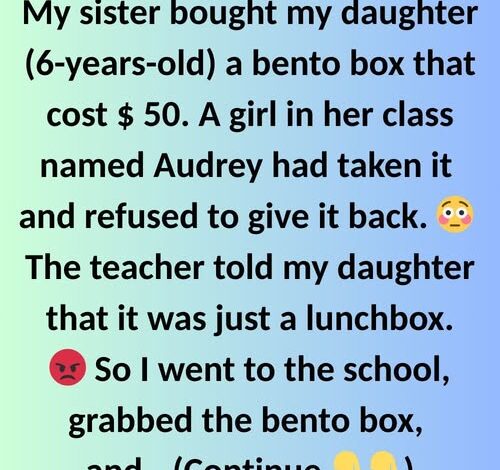
WHEN A LUNCHBOX BECAME A LESSON IN STANDING UP FOR MY CHILD!
Sometimes the smallest things—like a lunchbox—carry the biggest lessons. What started as a dispute over a bento box in my daughter’s first-grade classroom turned into an eye-opening experience about advocacy, empathy, and the way children learn about fairness.
It began when my sister gifted my six-year-old daughter, Nari, a special bento box. It wasn’t cheap—it cost $50—and it wasn’t just another school supply. For Nari, who is shy and soft-spoken, it was a treasure. She treated it with the reverence other kids reserve for toys or prized possessions.
On her second day bringing it to school, another girl in her class, Audrey, took it. She claimed it as her own and refused to give it back.
When Nari told her teacher, the response was dismissive: “It’s just a lunchbox.”
But it wasn’t just a lunchbox to my child. It was her gift, her special thing, and it mattered.
So I went to the school. Calmly, without making a scene, I retrieved the bento box from Audrey’s desk, placed it back in my daughter’s hands, and said loudly enough for the teacher to hear, “This belongs to Nari. It was a gift. It’s not just a lunchbox to her, and that matters.”
I thought that was the end of it.
By Thursday, however, I got a call from the principal asking me to come in for “a conversation.” When I arrived, Audrey’s mother was already there, arms crossed, glaring at me as if I had stolen something from her.
The moment I sat down, she erupted: “You had no right to take something out of my daughter’s hands like that. You embarrassed her. She cried after school!”
I was stunned. I calmly explained: “Your daughter took my child’s lunchbox. For two days. And refused to give it back.”
“She didn’t know it wasn’t hers,” Audrey’s mom shot back.
I blinked. “It has my daughter’s name etched into the side. In permanent gold letters.”
The principal tried to mediate but suggested something absurd: maybe the two girls could share the lunchbox until things “settled down.”
I laughed out loud. “So let me get this straight—my daughter receives a gift, someone else takes it, and the solution is…sharing?”
That’s when it hit me: this wasn’t just about a bento box. This was about how kids are perceived and treated. Nari is quiet, gentle, and doesn’t like to make a fuss. Audrey is loud, assertive, the kind of child teachers often praise as a “natural leader.” But leadership without kindness isn’t leadership—it’s dominance.
I asked to speak privately with Nari’s teacher. I needed to understand why, when a six-year-old reported that her belongings were taken, she was brushed aside.
The teacher looked exhausted and admitted she thought it would “work itself out.” She said, “It’s not always clear who brings what.”
So I showed her a photo on my phone: Nari holding the bento box the day she got it, eyes glowing, smile wide. “It’s clear to me,” I told her. “And it should have been clear to you when a child said her things were taken.”
To her credit, the teacher apologized. She admitted she mishandled it and promised to talk to Audrey, and to the class, about respect and boundaries.
The next day, Nari came home smiling. “Audrey said sorry,” she told me. “She didn’t sound like she meant it…but she said it.”
It was progress, even if small.
But two weeks later, Nari walked in the door without her bento box again. My heart sank. “Did someone take it again?” I asked.
She shook her head. “I gave it to Audrey.”
I was confused. “Why would you do that?”
Nari looked down, fiddling with the sleeve of her sweater. “Audrey said she doesn’t have nice stuff. She only has the plastic ones from the dollar store. She said she just wanted to feel special. Even for one lunch.”
That stopped me cold.
Suddenly, I saw the situation differently. Standing up for Nari had been the right thing to do—she needed to know her voice mattered and that I would protect her boundaries. But maybe Audrey wasn’t just being cruel. Maybe she was a little girl aching for something she didn’t have. Maybe her boldness was less about entitlement and more about longing.
I talked it over with my sister, and together we decided on something small but meaningful. We found an affordable version of the same bento box online—still colorful, still cheerful, just not as pricey. We wrapped it with a note that read: “Everyone deserves to feel special sometimes. Enjoy.”
We asked the school to give it to Audrey privately, without attaching our names.
Two days later, Nari came home beaming. “Audrey was different today,” she said. “She let me borrow her crayons. She even gave me half her cookie.”
Maybe it was the new lunchbox. Or maybe it was just the simple act of kindness—someone acknowledging her, giving without expectation—that softened her edges.
Whatever it was, everything shifted.
What started as a fight over property became a bigger lesson—for me, for Nari, and hopefully for Audrey. I learned that standing up for my child is non-negotiable. Children need to know their voices matter, that their feelings won’t be dismissed as “just a lunchbox” or “not a big deal.”
But I also learned that sometimes the child we label as “mean” is simply a child wanting to be seen. Boundaries and compassion aren’t opposites—they work together. We can teach our kids both: how to defend themselves and how to see the humanity in others.
Nari still uses her bento box proudly. And every once in a while, she and Audrey swap snacks at lunch, sharing small pieces of themselves instead of taking.
For me, that’s the real win. Not just protecting what belongs to my daughter, but showing her that kindness, when offered freely, can change the story entirely.
If you’ve ever been in a moment where you had to stand up for your child—or if this story made you think, smile, or tear up—remember this: sometimes the biggest lessons come wrapped in the smallest packages. Even in a lunchbox.




